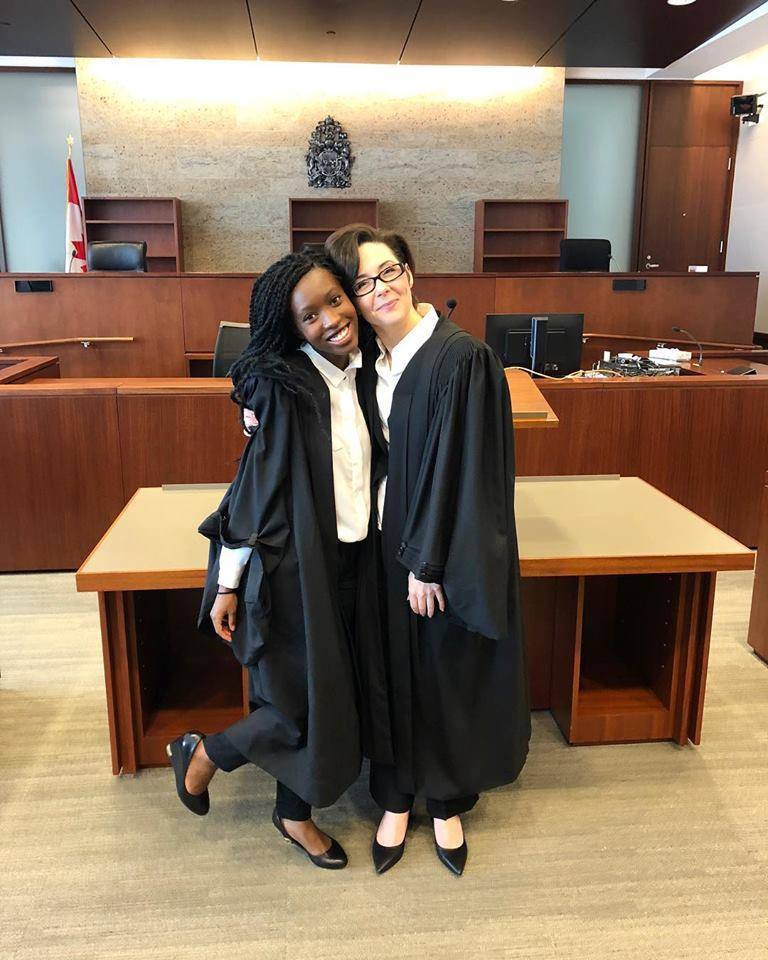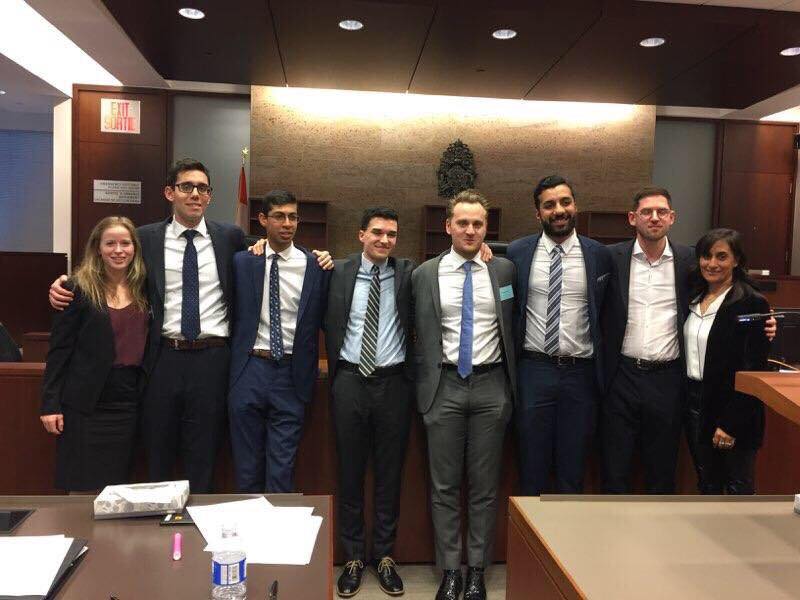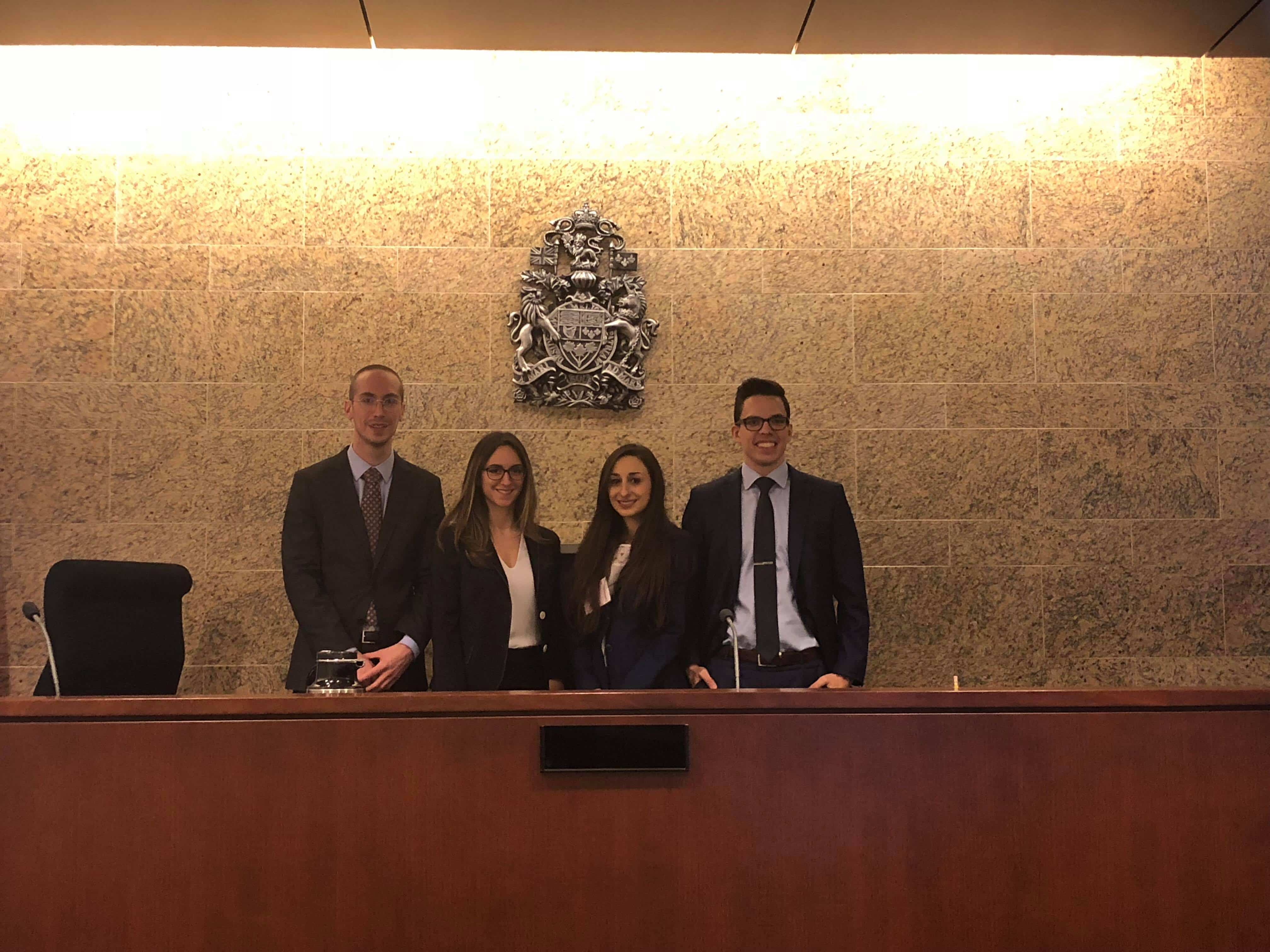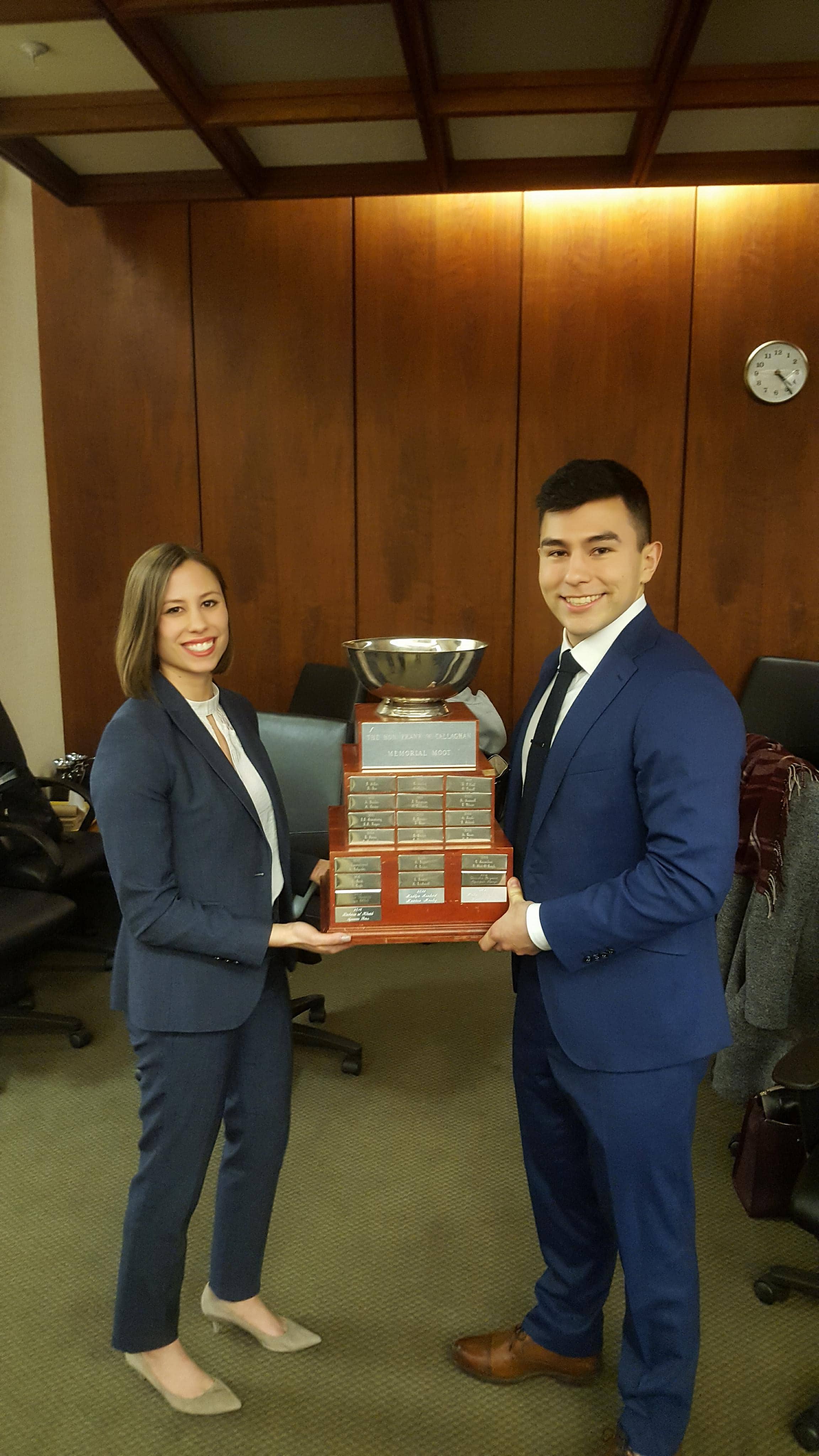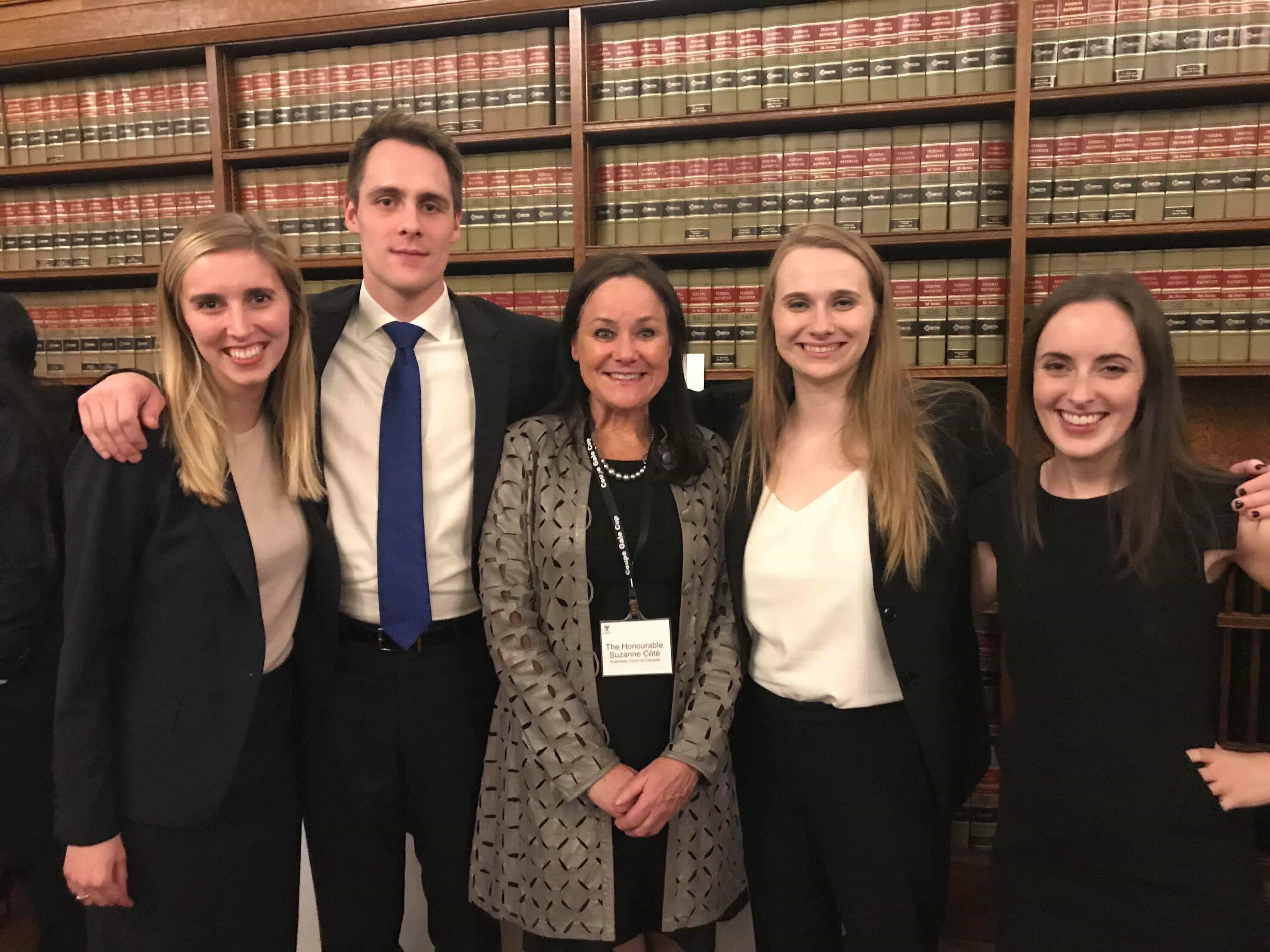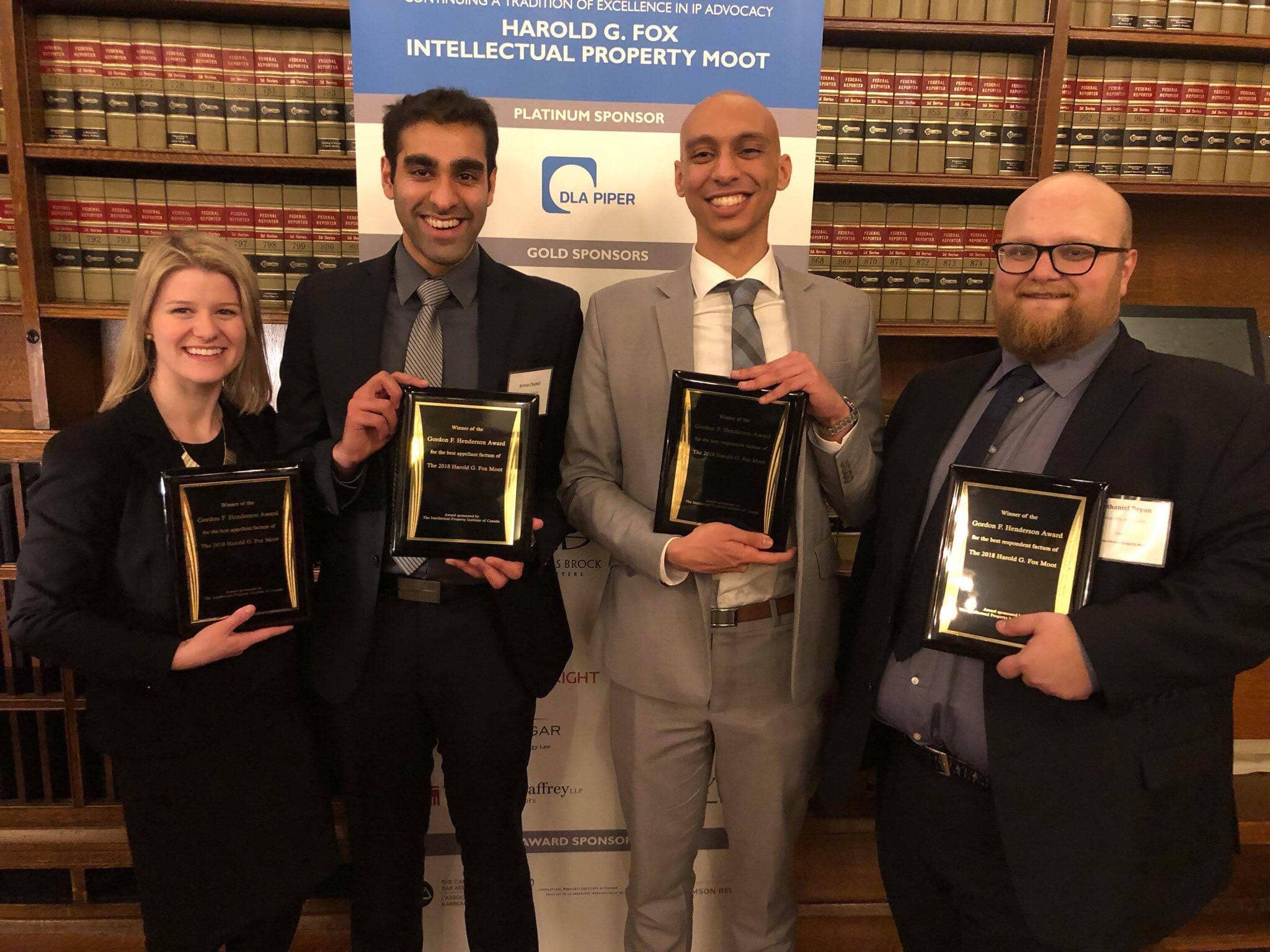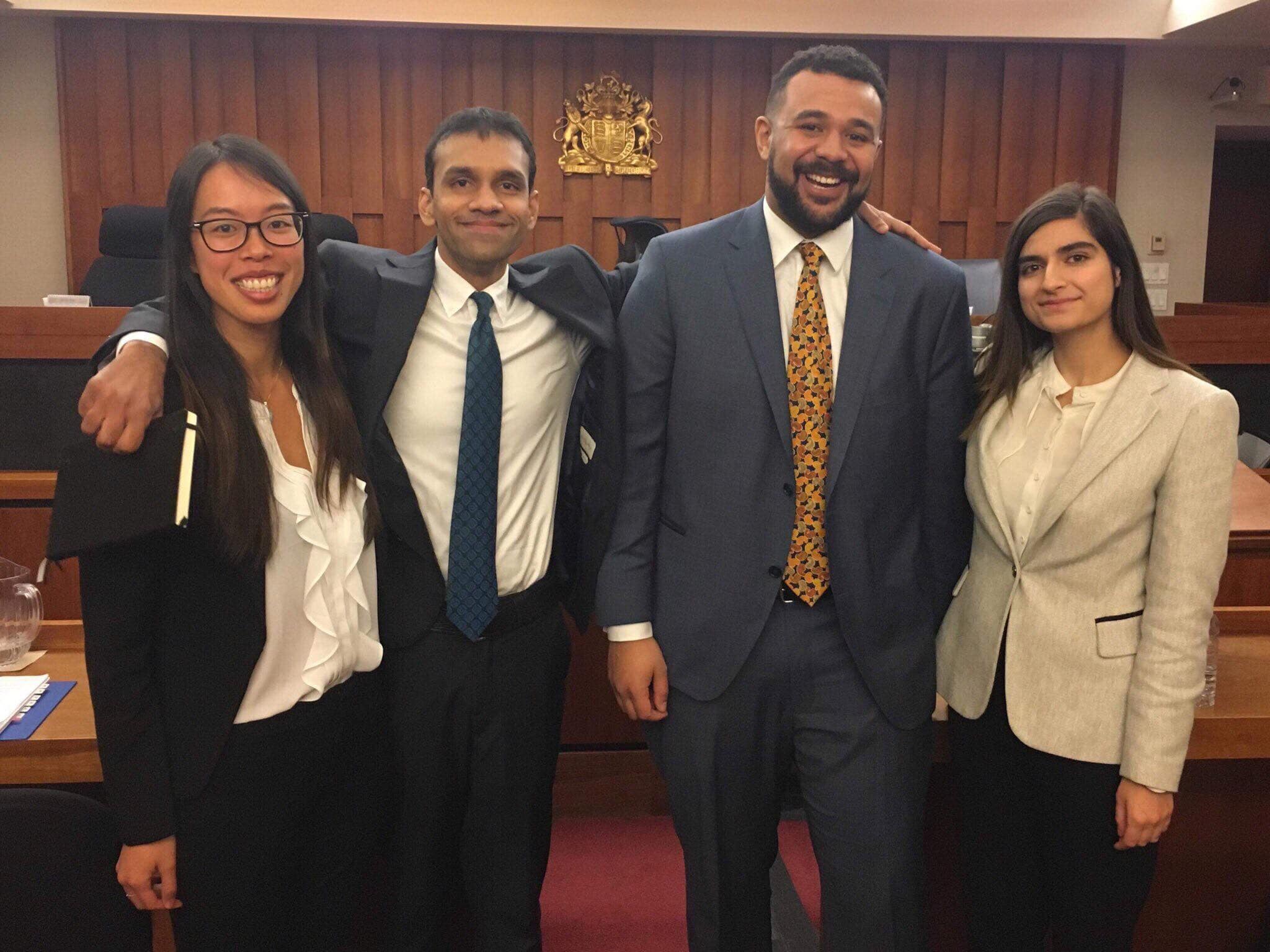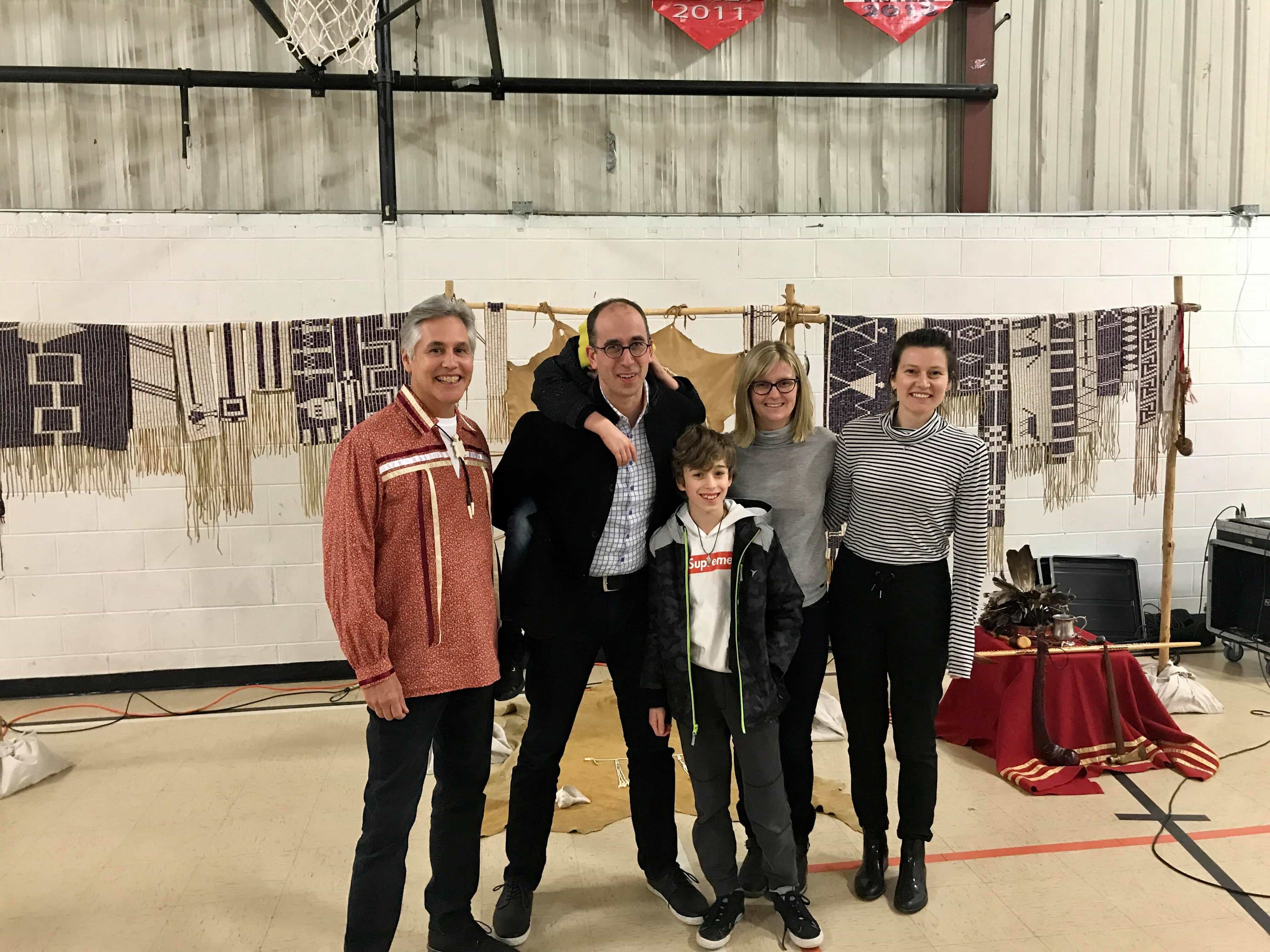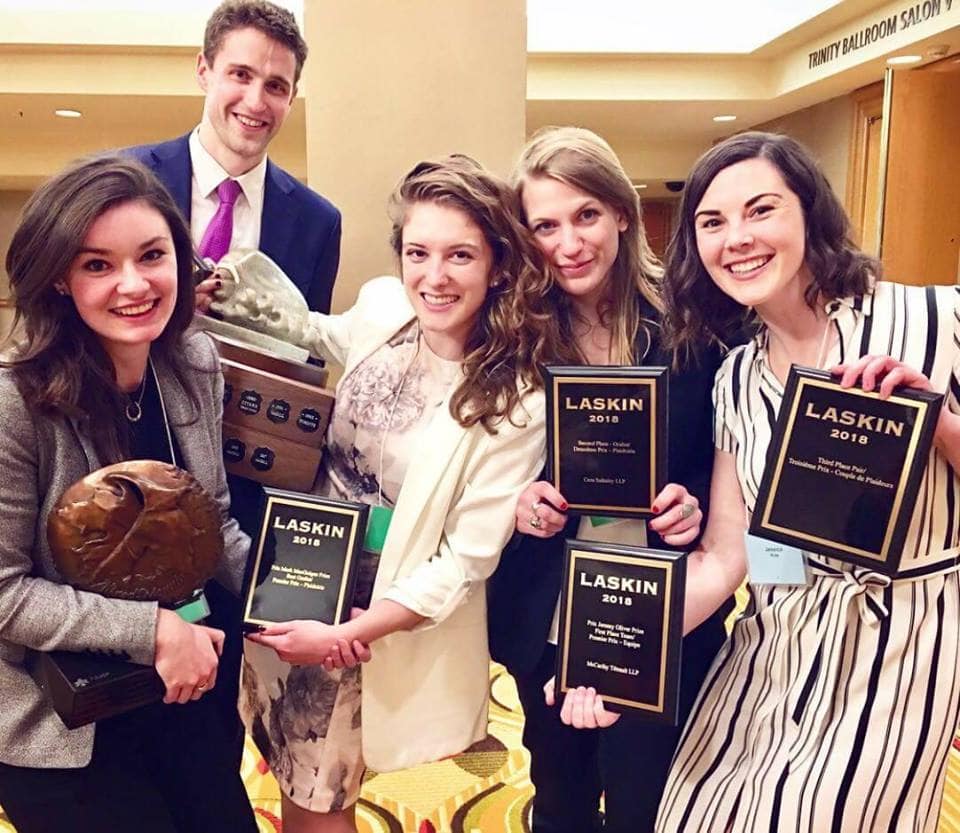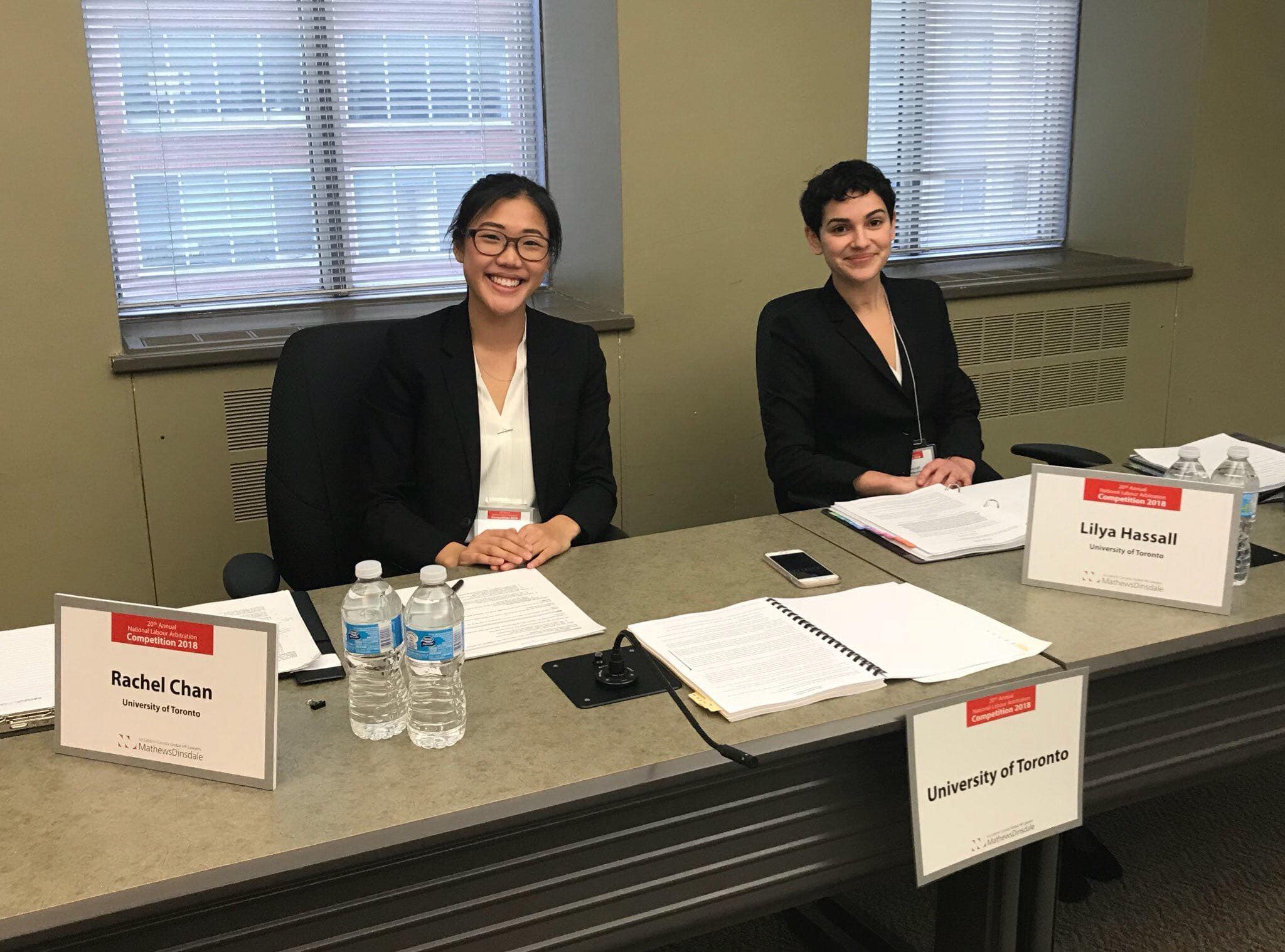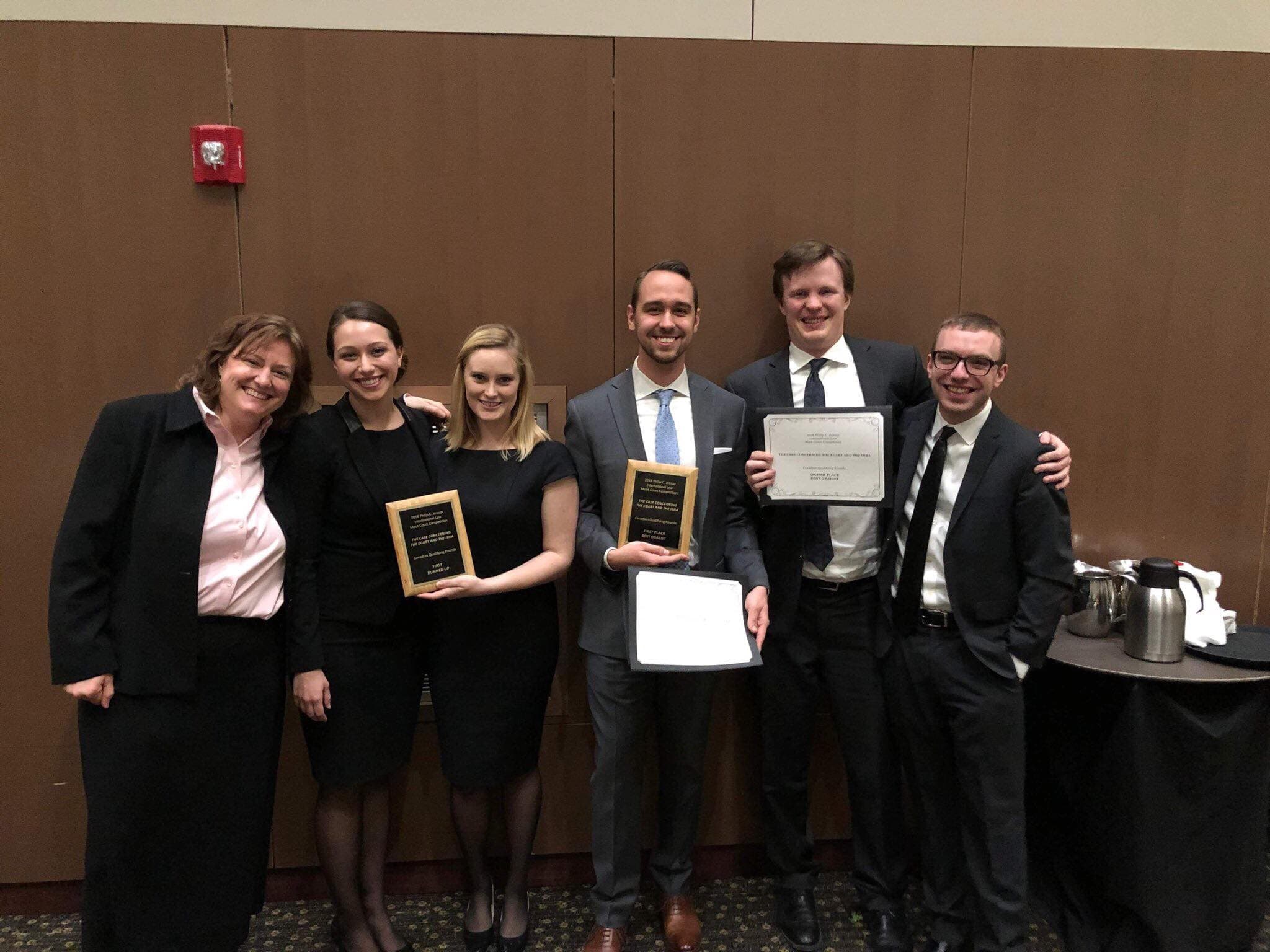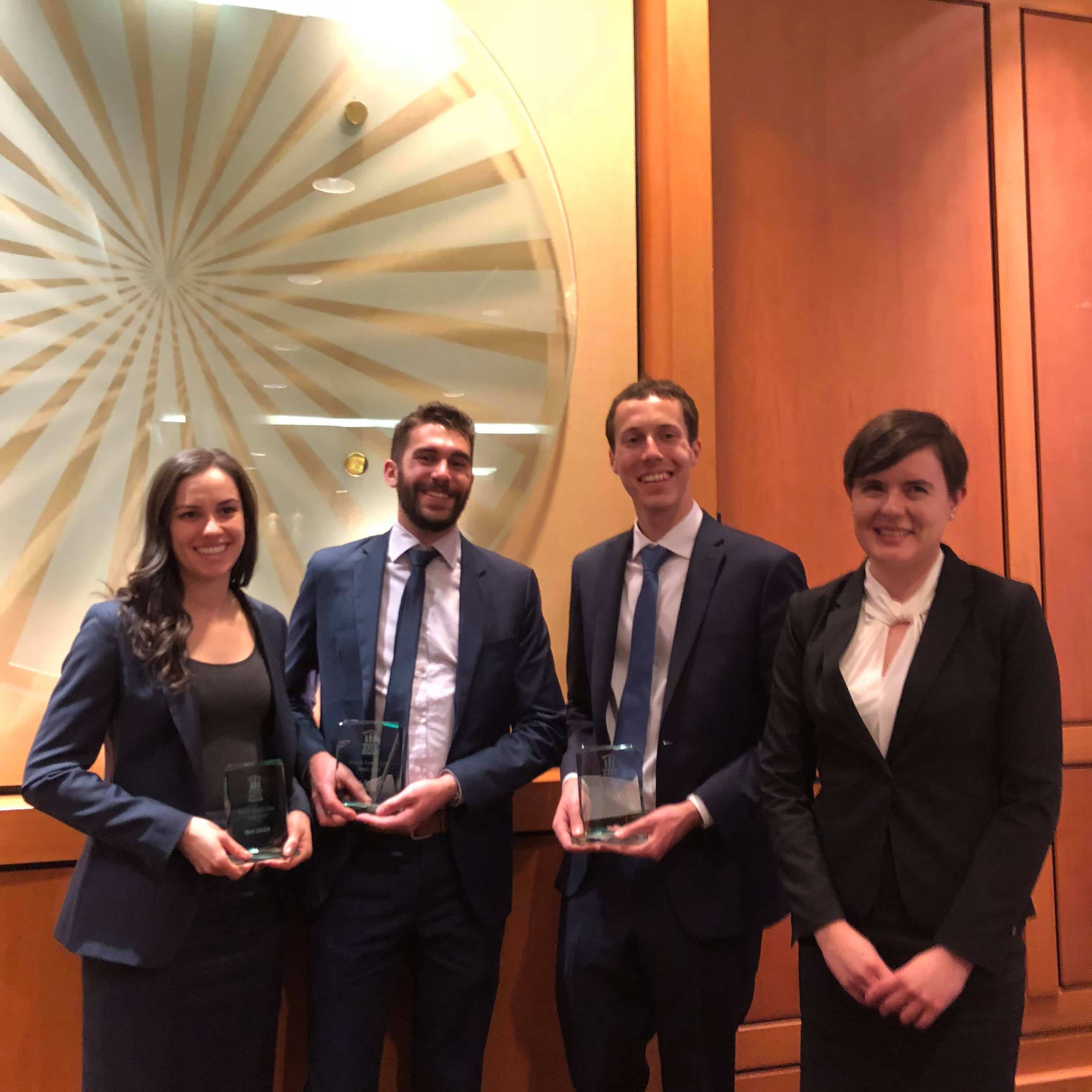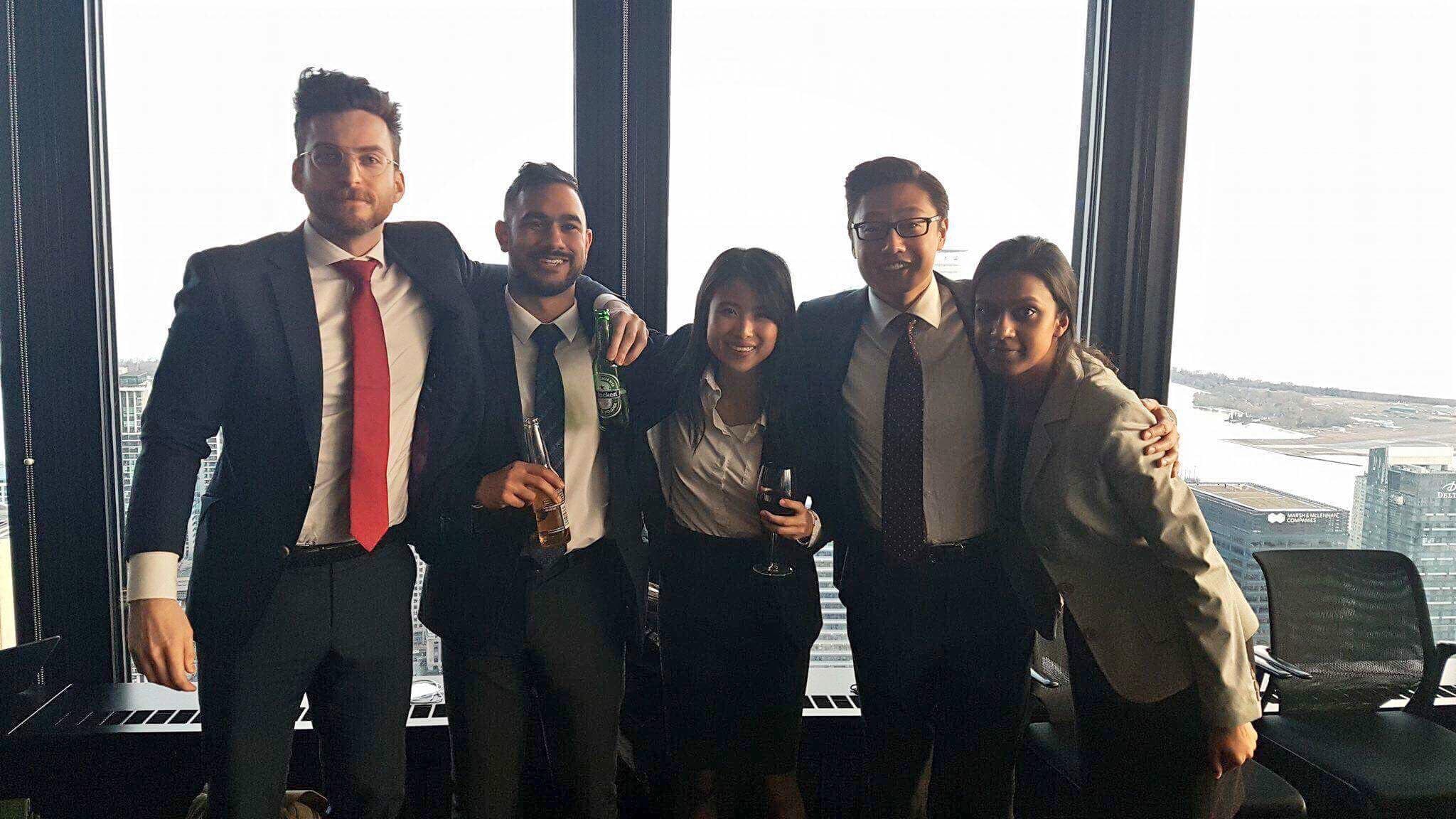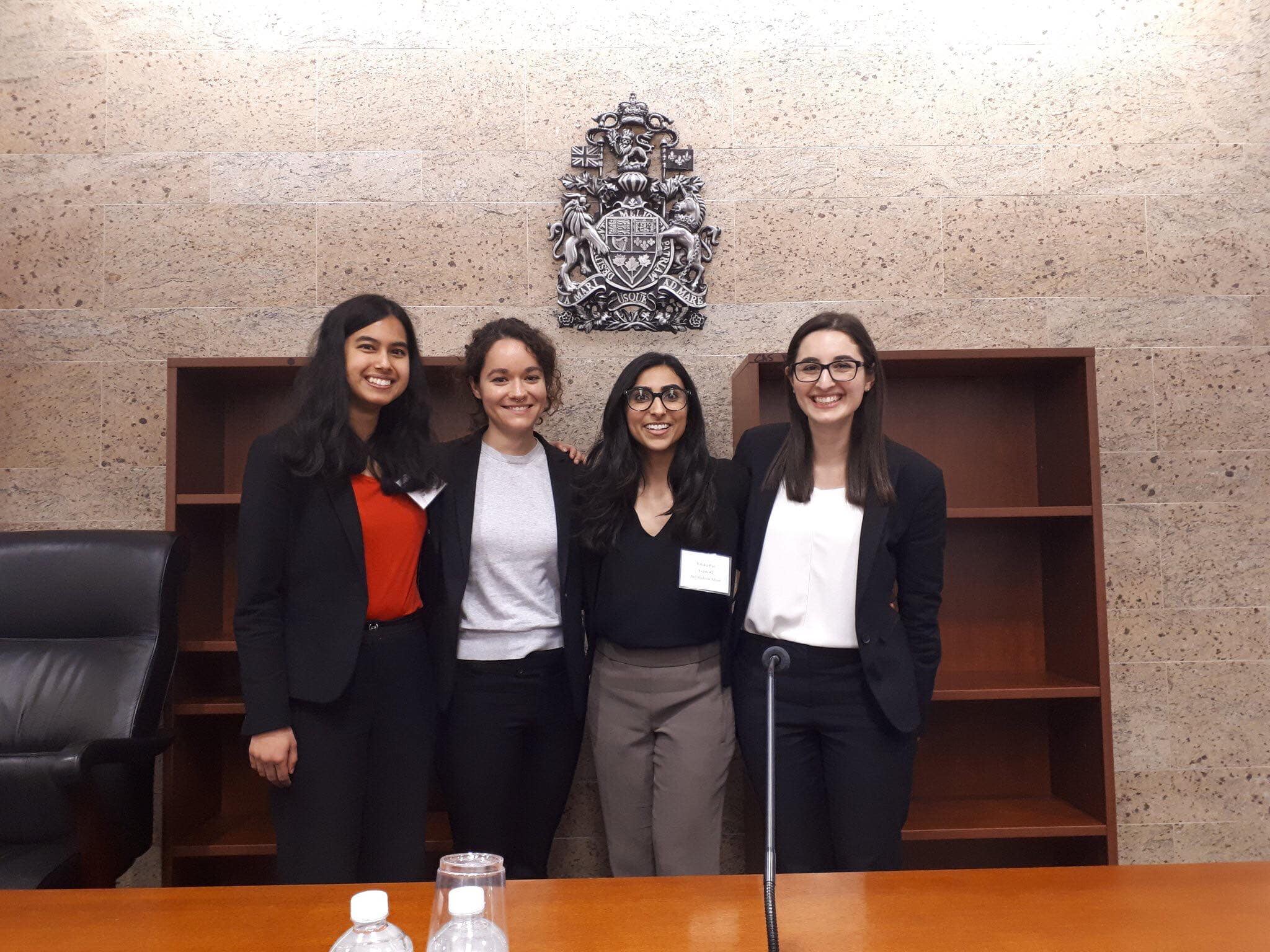The Moot Court Committee*
With the mooting season officially at an end, the MCC would like to extend a hearty congratulations to everyone who participated in competitive oral advocacy this year. The U of T teams had excellent showings at their various competitions. More importantly, we have heard from many of you how rewarding your time in the mooting program has been and how much you have learned about oral advocacy and the substantive areas of law you mooted. The MCC believes that oral advocacy is integral to the functioning of our justice system and that everyone should have an opportunity to hone those skills in law school. We are glad that so many of you had such an opportunity this year and we hope that those of you who are not graduating continue to stay involved with the mooting program as coaches.
The MCC would also like to thank all of the coaches for their hard work throughout the season. Our volunteer coaches are truly the backbone of the mooting program at U of T Law and, on behalf of ourselves and the mooters, we cannot thank you enough. We also continue to be grateful to the many alumni and local practitioners who generously give their time to conduct run-throughs with our teams. As the below results demonstrate, everyone’s hard work paid off!
We are also very pleased to share that next year’s Moot Court Committee will be comprised of: Holly Kallmeyer, Devyn Noonan, Chris Puskas, Ritika Rai, and Sarah Strban. We wish them the very best of luck and hope that they have as much fun as we did.
* The members of the 2017/2018 MCC were Jennifer Heaton, Stephanie Lewis, Maud Rozee, Diane Shnier, and Kerry Sun
**The MCC does not oversee the Arnup Cup/Sopinka Cup or the Kawaskimhon Moot, but wanted to acknowledge the many oral advocacy achievements at the Faculty this year.
Arnup Cup/Sopinka Cup**
Team members: Theresa Donkor and Ange Pagano
Coaches: Jonathan Shime (Cooper, Sandler Shime & Bergman), Megan Schwartzentruber (Cooper, Sandler Shime & Bergman)
Problem: Theresa and Ange were tasked with conducting a criminal trial involving a fatal car crash. The defendant was accused of dangerous driving causing death, street racing causing death, and failure to stop at the scene of an accident. For the Arnup Cup, U of T represented the Crown (it was a race!); for the Sopinka Cup, they represented the accused (it was a chase!).
Results: After winning the Silver Medal at the Arnup Cup, the U of T team moved on to the Sopinka Cup in Ottawa where they finished third in Canada. Ange also won the awards for Best Overall Advocate and Best Cross-Examination.
Cassels Brock Cup (“Baby Gale”) Moot
Team members: India Annamanthadoo, James Aston, Karen Chen, Eileen Church Carson, Tom Collins, Ioana Dragalin, Jake Eidinger, Emily Fraser, Daryna Kutsyna, Julie Lowenstein, Aylin Manduric, Matthew Marchello, Ryan Michael Marinacci, Ki Won (Daniel) Moon, Su Rao, Emma Ryman, Kate Somers, Nicole Thompson, Emily Tsui, Gerard Westland
Coaches: Ashley Bowron, Holly Kallmeyer, Julia Kirby, Nicholas Martin, Devyn Noonan, Meena Sundararaj
Problem: Every year, the Baby Gale Mooters moot the same problem as the Gale Cup Mooters. The Gale problem is described below.
Results: The U of T team was bested by Osgoode this year by the slightest of margins (11 points). However, the team had an excellent showing overall, with Julie and Jake winning the prize for Top Appellant Team, and Emily T and Su winning for Top Respondent Team. The team also won the following oralist prizes: Emily T (1st) and Julie (3rd).
Davies Corporate/Securities Law Moot
Team members: Adil Abdulla, Dylan Murray, Chris Puskas, Shaan Tolani
Coaches: Jennifer Heaton, Eric Patenaude, Avram Spatz, Professor Anita Anand
Problem: The problem was based off Essar Global. It involved complex corporate law issues relating to corporate mismanagement, directorial conflicts of interest and available remedies.
Results: The U of T team placed first overall. In addition, Adil won the top oralist prize and Chris won the second top oralist prize. The team also took home the prize for third place facta.
Donald G. H. Bowman National Tax Moot
Team members: Maria-Christina Christodoulou, Stephanie D’Amico, Mathew Elder, David Rybak
Coaches: Patricia Lahoud, Elizabeth White, Al-Nawaz Nanji (Osler), Martha MacDonald (Torys)
Problem: The mooters’ submissions focused on whether the residence of a trust should be determined by the location of its trustee, or by a fact-specific inquiry into where the trust was managed and controlled.
Results: The coaches commended the mooters for their ability to demonstrate their deep understanding of a complex issue. Each of the mooters persuasively articulated their respective clients’ positions.
Frank W. Callaghan Memorial Moot
Team members: Natasha Anzik, Jordyn Benattar, Joshua Favel, Wendes Keung, Hatim Kheir, Chloe Magee, Daniel Milton, Bethanie Pascutto, Christoph Pike, Timothy Shin, John Sime, Kennedy Simpson, Sierra Skoropada, Robin Spillette, Gordon Vance, Michael Xia
Coaches: Brendan Bohn, Ashley Bowron, Jennifer Che, Patrick Harris, Benjamin Pan, Benjamin Shakinovsky, Diane Shnier, Gabrielle Thompson, Professor Hamish Stewart
Problem: A creepy high school dance teacher filmed his female students in their leotards during rehearsal using spy glasses. The mooters argued about whether this was voyeurism and whether the recording could be admitted as evidence under s 24(2) despite its unlawful search and seizure.
Results: Joshua and Sierra placed first overall, with Wendes and Timothy coming in second. Daniel and Gordon earned the award for Best Appellant Factum, while Jordyn and Bethanie were awarded the prize for Best Respondent Factum. The oralist prizes went to: Daniel (1st), Hatim (2nd), and Joshua (3rd).
The Gale Cup Moot
Team members: Ashley Bowron, Holly Kallmeyer, Nicholas Martin, Devyn Noonan
Coaches: Catherine Fan, Aidan Fishman, Stephanie Lewis, Paul-Erik Veel (Lenczner Slaght), Sinziana Hennig (Stikeman Elliott)
Problem: This year’s Galers were tasked with appealing R v Paterson (2017 SCC 15) to the Moot Court of the Gale Cup. The issues on appeal were: (1) whether the police officers’ intrusion into Mr. Paterson’s home was justified by exigent circumstances, pursuant to s 11(7) of the Controlled Drugs and Substances Act, or whether it amounted to a breach of his s 8 Charter rights; (2) if Mr. Paterson’s Charter rights were breached, whether the evidence should be excluded under s 24(2); and, (3) whether the common law confessions rule should apply in a Charter voir dire.
Results: U of T placed second overall. Nicholas and Devyn represented the team in the final round before a highly distinguished panel, which included Justice Côté of the Supreme Court of Canada. Nicholas also won the Dickson Medal for Oral Advocacy.
Harold G. Fox Intellectual Property Moot
Team members: Arrondeep Chahal, Nathaniel Bryan, Jacquelyn Smalley, Louell Taye
Coaches: Maud Rozee, Edward Sullivan, Andrew Shaughnessy (Torys) and Dominique Hussey (Bennett Jones)
Problem: The Foxes took on a trademark problem about two cheese producers using the term “Daisy Isle.” At issue was whether the designation of “Daisy Isle” as a Geographical Indication provided an absolute defence against claims of passing off, and whether passing off had occurred.
Results: Both teams made it to the semi-finals, and took home prizes for Best Respondent Factum and Best Appellant Factum. The Respondents (Nathaniel and Louell) advanced to the finals and ultimately placed second. Nathaniel also won the award for excellence in mooting—a sponsored trip to compete in the Oxford International Intellectual Property Moot next year!
Julius Alexander Isaac Diversity Moot
Team members: Tina Cody, Gaurav Gopinath, Solomon McKenzie, Lynn Tay
Coaches: Theresa Donkor, Anna Spieser, Joseph Cheng (DOJ)
Problem: The mooters worked on the appeal of R v Welsh (2013 ONCA 190), a murder case where confessions made to an undercover police officer impersonating a religious leader in the course of the investigation were crucial to the Crown’s case. The mooters engaged with the religious freedom of minorities and the fine line between a tailored police investigation and a discriminatory one.
Results: The Respondent team (Tina and Solomon) placed second overall and Solomon won the “Spirit of the Moot” prize, which is awarded to the mooter who best exemplified the ideals of the moot and its commitment to diversity and advancing critical race theory in advocacy. Additionally, the team took the prizes for First Place Factum (Gaurav and Lynn) and Second Place Factum (Tina and Solomon).
Kawaskimhon National Aboriginal Moot**
Team members: Stephanie Lewis and Emily Young
Coaches: Professor Douglas Sanderson, Bryce Edwards (Olthuis Kleer Townshend), Krista Nerland (Olthuis Kleer Townshend)
Problem: The problem was based on the Oka crisis and the parties were tasked with negotiating a solution to provide for the status, protection, and control of Indigenous cultural objects and the sites on which they are found.
Results: The Kawaskimhon moot is a non-adversarial, non-competitive moot. This year, the U of T team’s facilitator invited the parties at the table to conduct their negotiations in accordance with Haudenosaunee clan-based governance practices. The table successfully negotiated many aspects of a protocol for the use and protection of Kanehsatà:ke and the cultural heritage items located there.
The Laskin Moot
Team members: Aaron Haight, Becky Lockert, Morag McGreevey, Anna Spieser
Coaches: Jessica Kras, Sarah Corman (Corman Feiner), William MacLarkey (CLOC)
Problem: The Problem this year, which focused on the cancellation of a rehabilitative prison program and subsequent protest by the affected inmates, required an analysis of virtually every pertinent issue in administrative law today. The mooters proved to be up to the challenge, finishing with the best results that U of T has ever seen at the Laskin.
Results: It truly was a banner year for the U of T Laskin team, with impressive wins in nearly every category. The U of T team won Best Team Overall, with Aaron and Becky winning Second Place Pair and Morag and Anna winning Third Place Pair. The team also took home the following oralist prizes: Morag (1st), Anna (2nd), Aaron (3rd).
Mathew, Dinsdale & Clark Canadian Labour Arbitration Competition
Team members: Rachel Chan and Lily Hassall
Coaches: Tamie Dolny, Emily Young, Stephen Shore (Ogletree Deakins), Maeve Biggar (CaleyWray)
Problem: The Timothy Riggins Academy, a private secondary institution, employed a teacher and a janitor, both of whom were grieving discipline for separate breaches to the school’s Drug and Alcohol Policy.
Results: Lily and Rachel made it to the finals against Queens and ultimately walked away with the second place prize. Rachel delivered a passionate and eloquent argument about the role that addiction played in the employees’ behaviour, while Lily had the awesome responsibility of arguing against Supreme Court of Canada Justice Malcolm Rowe’s position in Stewart v Elk Valley before Justice Rowe himself!
Phillip C. Jessup International Law Moot
Team members: Misha Boutilier, Alexandria Matic, Daniel Sisgoreo, Sarah Strban
Coaches: Lewis Fainer, Kerry Sun, Professor Karen Knop, Maureen Whelton (Stevenson Whelton MacDonald & Swan)
Problem: In this hypothetical dispute before the International Court of Justice, a rogue state ignored an arbitral award, captured a marine vessel, commissioned a nuclear submarine and was denounced by the United Nations Security Council as a threat to international peace and security.
Results: In a performance that can only be described as the height of rigour, the U of T team went undefeated in the six preliminary rounds and the final round. The team placed second overall in points and received the prize for Second Overall Respondent Memorial. As for oralist prizes, Misha placed eighth overall while Daniel placed first. The U of T team advanced to the international rounds in Washington, DC, where they will compete in early April (someone send them upper-year maps…they still have exams!).
The Walsh Family Law Moot
Team members: Emily Dyer, Jackson Foreman, Alexis Giannellia, James Schneider
Coaches: Ange Pagano, Ashley Peoples, Daniel Smith, Martha McCarthy (Martha McCarthy & Company), Sarah Young (Martha McCarthy & Company)
Problem: The mooters were required to grapple with the issue of how courts can best resolve the tension between respecting the wishes of an older, alienated child and forcing family reunification therapy.
Results: The judges were impressed across the board by the team’s elegant presentation and their expert command of the material, praising each of the mooters individually on their performances. James and Jackson won Best Appellant Factum and Alexis won Best Oralist.
The Warren K. Winkler Class Actions Moot
Team members: Andrew Basso, Brenda Chang, Albert Kwan, Andrew Sahai
Coaches: Alex Matic, Amani Rauff, Gaby Schachter, Professor Simon Stern, Mike Eizenga (Bennett Jones)
Problem: The Winkler mooters argued the certification of a privacy class action based on the disclosure of information from a Tinder-esque dating app to a third-party company, for the purposes of targeted advertising.
Results: The U of T Plaintiff team (Brenda and Albert) made it to the finals and came in second overall. U of T also swept the oralist awards: Albert (1st), Andrew (2nd), and Brenda (3rd).
The Wilson Moot
Team members: Hayley Goldfarb, Julia Kirby, Ritika Rai, Meena Sundararaj
Coaches: Wes Dutcher-Walls, Katie Longo, Maryam Shahid, Professor Lorraine Weinrib, Cheryl Milne (Asper Centre), and Joseph Cheng (DOJ)
Problem: The mooters were tasked with arguing a s 15 Charter challenge to a police hiring regulation that required consideration of carding information on the grounds that it discriminated on the basis of race. The problem also included an interesting s 24(1) issue that revisited past jurisprudence on constitutional exemptions.
Results: After mooting in the finals before a distinguished panel which included Chief Justice Wagner of the Supreme Court of Canada, the U of T Wilson team placed second overall. The team also took third place for their factums, and Meena was awarded second top oralist.


